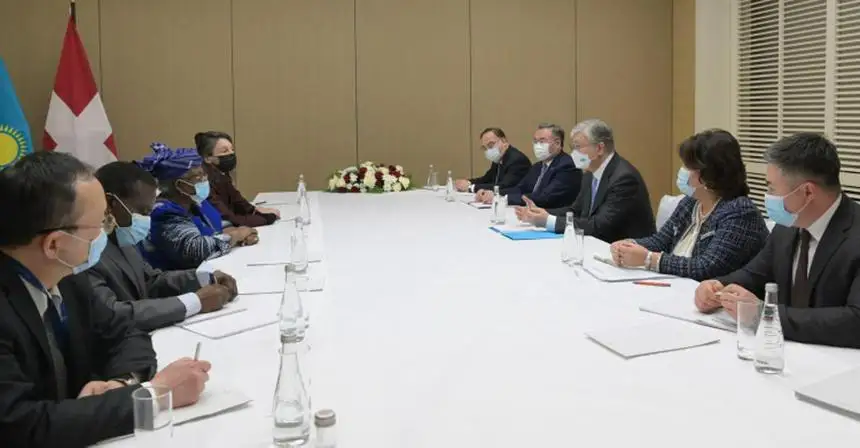Kazakhstan’s Chairmanship of WTO’s MC12 ends successfully

Kazakhstan joined the WTO only six years ago and became the youngest country chairing the Ministerial Conference. In addition, for the first time in history, the highest governing body of the WTO was chaired by a country that joined the Organization after the founding of this global institution in 1995, a landlocked country and a country from the Eurasian region.
The successful chairmanship of Kazakhstan was facilitated by regular contacts at the highest level, during which special attention was paid, among other things, to the preparation for the MC12. In particular, the President of the Republic of Kazakhstan Kassym-Jomart Tokayev, during a videoconference with the Director-General of the WTO Ngozi Okonjo-Iweala in May 2021, emphasized that cooperation to strengthen the multilateral trading system within the WTO is a strategic priority for Kazakhstan.
During a bilateral meeting with the Director-General of the WTO, which took place in the course of the visit to the Swiss Confederation in November 2021, the Head of State also noted that it is a great honor for Kazakhstan to chair the MC12 and confirmed our country’s readiness to make a constructive contribution to the discussion of all outstanding issues of the WTO negotiation agenda.
WTO Director General Okonjo-Iweala highly appreciated Kazakhstan's chairmanship and expressed gratitude to the leadership and the Government of Kazakhstan for the fruitful cooperation in the preparations for the Conference and for the skill and flexibility in overcoming the various challenges towards this global event, including its relocation from Nur-Sultan to Geneva due to the coronavirus pandemic.

As a result of MC12, trade ministers from 164 WTO member countries adopted a historical agreement to prohibit subsidies that contribute to illegal, unreported and unregulated fishing. This agreement seeks to limit overfishing to preserve the livelihoods of communities that rely on fisheries from the perspective of food security and employment.
The MC12 decision allowing limitation of intellectual property rights to produce safe and effective vaccines and to expand the supply of vaccines to developing and least developed countries is essential with respect to preventing, treating, or containing the spread of the COVID-19 pandemic.
In order to provide food to the population of developing countries amid rising food prices, it was decided to remove export bans or restrictions on food aid provided by the UN World Food Program.
Recognizing the importance of developing digital services and products, especially during the pandemic and economic recovery, ministers agreed to continue the implementation of the Work Programme on Electronic Commerce and extend the moratorium on imposing customs duties on electronic transmissions until the next WTO Ministerial Conference. This decision provides certainty and predictability for businesses and consumers and promotes the benefits of the digital economy.
In her closing speech at MC12, the WTO Director General emphasized that trade is part of the solution to the crises of our time, and the package of agreements reached demonstrated the ability of WTO member countries to come together to bridge geopolitical gaps, respond to global challenges, address environmental issues and promote greater social and economic integration.
A standout feature of the WTO's 12th Ministerial Conference is the unprecedented number of decisions by member countries, demonstrating that the WTO continues to be the only multilateral forum for formulating and regulating international trade rules, and plays an important role in addressing the most pressing global challenges.